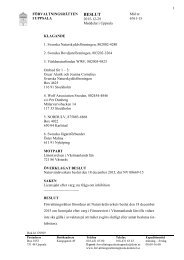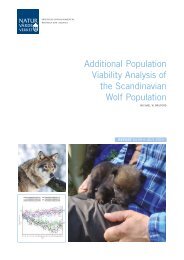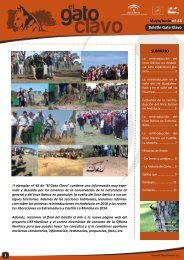1oC3Dbk
1oC3Dbk
1oC3Dbk
Create successful ePaper yourself
Turn your PDF publications into a flip-book with our unique Google optimized e-Paper software.
implemented. Members of the PSG are participating by<br />
offering expert advice and training.<br />
The participants of the 1st workshop on pelican research<br />
and conservation in SE Europe which was held in Prespa on<br />
1–2 May 2012, prepared an article based on the main results<br />
of the workshop. The article is about the current status (2011–<br />
2012) of Dalmatian and Great White Pelicans in the Black<br />
Sea / Mediterranean flyway and has now been submitted for<br />
publication.<br />
A joint initiative was launched by the Society for the<br />
Protection of Prespa and the Hellenic Ornithological Society,<br />
to provide training and guidance to management bodies of<br />
protected areas in Greece, which host Dalmatian pelican<br />
nesting colonies (Amvrakikos, Messolonghi and Karla);<br />
focusing on identification, ageing, surveying and monitoring<br />
of breeding performance in these colonies. Training<br />
commenced in 2012, with two on-site visits at Amvrakikos,<br />
and more visits are scheduled for 2014. In April 2013,<br />
the Society for the Protection of Prespa and the Hellenic<br />
Ornithological Society organized the first simultaneous census<br />
of Dalmatian and Great White Pelicans throughout Greece;<br />
i.e. on all wetlands where pelicans regularly occur. This data<br />
has allowed us to make the first-ever approximation of birds<br />
present in the country during the breeding season. The<br />
census targeted all birds (adult and immature) regardless of<br />
breeding status.<br />
Twelve Dalmatian pelicans of various ages were caught<br />
and tagged with GPS transmitters in 2012 and 2013, by the<br />
Society for the Protection of Prespa (SPP) within its permanent<br />
Pelican conservation program. In this context, a member<br />
of SPP’s Conservation and Research Team visited Israel in<br />
October 2012, following an invitation by pelican experts from<br />
The Israel Nature and Parks Authority (INPA) with the objective<br />
of gaining experience and training in capture and marking<br />
techniques. Six of the pelicans are still being tracked during<br />
post-breeding migration and wintering. All SPP actions for<br />
pelicans were funded by the MAVA Foundation (Switzerland)<br />
and the Green Fund (Greek State).<br />
A project called ‘Investigation of Population Size and<br />
Trend, Breeding Biology, Migration and Gene Flow Patterns<br />
of Dalmatian Pelican (Pelecanus crispus) in Turkey in a<br />
Conservation Perspective’ which started in 2011, continues<br />
to be successful. This project is funded by TUBITAK. Some<br />
of the activities included in this project are ringing, (ongoing in<br />
four wetlands – more than 150 juveniles were ringed in 2013),<br />
tagging and tracking (four juveniles were wing tagged with<br />
transmitters for the first time in Lake Aktas, Turkey, and are<br />
being tracked regularly).<br />
Giorgos Catsadorakis<br />
Chair, Pelican Specialist Group<br />
Pinniped Specialist Group<br />
The activities of the Pinniped Specialist Group in 2013<br />
included; extensive interface with and participation in the<br />
newly formed Climate Change Specialist Group; serving as<br />
a contact point for the IUCN Marine and Polar Programme,<br />
various regional offices and the SSC / CEESP Sustainable<br />
Use and Livelihoods Specialist Group on seal-related issues,<br />
and preparing to undertake the upcoming re-assessment of<br />
pinniped species on The IUCN Red List.<br />
The latter activity included expanding our group, with<br />
two new members to improve the coverage of available<br />
knowledge on pinnipeds globally and to deal with taxonomic<br />
reassessments. Critically Endangered species and populations<br />
remain a focal point for the group, but members of the<br />
PSG are also heavily engaged with local threats to pinniped<br />
populations presented by fisheries operations, industrial<br />
development and in some cases, unsustainable harvesting of<br />
the pinnipeds themselves.<br />
Dr Kit Kovacs<br />
Chair, Pinniped Specialist Group<br />
Polar Bear Specialist Group (PBSG)<br />
The PBSG is unlike the majority of other Specialist Groups as<br />
it not only focusses on a single species, but centers its work<br />
around a regional single-species conservation agreement.<br />
This is the ‘Agreement on the conservation of polar bears’ of<br />
1973, which was negotiated by the group in its infancy, and<br />
taken care of by the group for a long period while the Parties<br />
to the agreement were inactive between 1981 and 2007. The<br />
PBSG has taken a conservative approach to this very<br />
important task and has therefore reserved group membership<br />
for active expertise in the field of polar bear research and<br />
management.<br />
Dalmation pelicans – adults, immatures and juveniles in the Evros Delta,<br />
Greece. © Giorgos Catsadorakis<br />
Atlantic Walrus. © Kit M. Kovacs and Christian Lydersen, Norwegian Polar<br />
Institute<br />
Specialist Groups, Task Forces and Red List Authorities<br />
75






